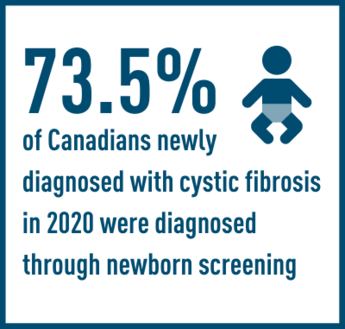Health Canada approves Trikafta, transformational cystic fibrosis medication, for children aged six to 11
TORONTO, April 20, 2022 – The Canadian cystic fibrosis community is celebrating today as Health Canada approves the life-changing cystic fibrosis drug, Trikafta, for children aged six to 11 with at least one F508del gene mutation. The medication was approved for those 12 and older in June 2021, and many Canadians’ lives are already being transformed. While this news is promising, Canadian children with cystic fibrosis will only gain access to Trikafta when public and private insurers agree to cover it.
Trikafta is considered the single greatest innovation in the history of cystic fibrosis. It can treat up to 90% of Canadians with cystic fibrosis and addresses the underlying causes of the disease instead of just managing the symptoms. This approval by Health Canada is one important step towards re-writing the story for children and adults with cystic fibrosis.
“Cystic fibrosis is a progressive disease, and children accumulate extensive damage to their lungs between the ages of six and 20,” said Dr. John Wallenburg, Chief Scientific Officer of Cystic Fibrosis Canada. “This damage is often irreversible and causes severe harm to their overall health and wellbeing. Early access to Trikafta can slow the progression of symptoms and reduce the decline in a child’s condition, forever altering the course of their disease and their future.”
Cystic Fibrosis Canada is calling on provinces, territories, and private insurers to immediately fund Trikafta for Canadians aged 6 plus and to follow the guidance of CF clinicians, as noted in the Cystic Fibrosis Canada led and clinician developed, consensus guidelines for modulator use, that recommend no start criterion.
“Last fall we saw the provinces and territories move quickly to cover this drug, a testament to how transformational Trikafta is. Today, we ask for that same urgent action, that same commitment to save lives, but this time, let’s not leave anyone behind,” says Kelly Grover, President and CEO of Cystic Fibrosis Canada.
Trikafta is also currently in review with Canada’s health technology assessment bodies, the Canadian Agency for Drugs and Technolgies in Heath (CADTH) and the Institut national d'excellence en santé et en services sociaux (INESSS). These agencies are expected to update their recommendations on Trikafta’s cost-effectiveness to include Canadians aged 6 and older. When CADTH and INESSS reviewed Trikafta for ages 12 and older in 2021, they recommended for the drug to be funded by public drug plans, but with overly restrictive access criteria. The CADTH review for ages 6 and older will include new, published data showing that people with FEV1 measures of 91% or greater received significant benefit from Trikafta.
Despite the potential for Trikafta to help 90% of Canadians living with cystic fibrosis, many Canadians aged 12+ still can’t access the drug. With some jurisdictions and private insurers having implemented CADTH and INESSS’s restrictive access criteria, while also having complex reimbursement systems, many Canadians with cystic fibrosis are being left out. The health technology assessments now underway are an opportunity for provinces, territories and private insurers to follow the guidance of CF clinicians.
Cystic Fibrosis Canada calls upon key decision makers in Canada’s provinces and territories to remember that while CADTH’s recommendations can help inform their decisions to fund new medications, ultimately CADTH’s recommendations are non-binding. This means the jurisdictions can choose to cover the drug now for anyone indicated by Health Canada and decide what, if any, restrictions to apply.
“Trikafta is already working miracles for many people aged 12 and over in Canada,” said Wallenburg. “We need to ensure that no one is left behind. Private and public funders should not impose clinical conditions. Clinicians – and only clinicians – should be making treatment decisions for their patients.”
#FurtherTogether campaign for Cystic Fibrosis Month
May is Cystic Fibrosis Month, and Cystic Fibrosis Canada is encouraging Canadians to take action and go even further to ensure children and everyone with cystic fibrosis live healthier and longer lives.
Supporters and advocates can visit to learn about our #FurtherTogether campaign and join us to write, meet or donate to fuel the fight for access to life-saving medicines for people with cystic fibrosis.
Rally for Trikafta
Members of the community and supporters are invited to join a Facebook Live Rally for Trikafta on April 20th at 7pm EST on Cystic Fibrosis Canada’s English Facebook page and April 21st at 7 pm EST on the French page. The events will bring the community together to discuss Health Canada’s decision and hear about next steps to gaining access to life-changing cystic fibrosis medications.
About Cystic Fibrosis
Cystic fibrosis is the most common fatal genetic disease affecting Canadian children and young adults. There is no cure. Of the Canadians with cystic fibrosis who died in the past five years, half were under the age of 37. Cystic fibrosis is a progressive, degenerative multi-system disease that affects mainly the lungs and digestive system. In the lungs, where the effects are most devastating, a build-up of thick mucus causes severe respiratory problems. Mucus and protein also build up in the digestive tract, making it difficult to digest and absorb nutrients from food. In addition to the physical effects of the disease, mental health concerns are emerging; anxiety and depression are common among this population. Double lung transplants are the final option for patients with end-stage disease; most fatalities of people with cystic fibrosis are due to lung disease.
About Cystic Fibrosis Canada
Cystic Fibrosis Canada has dramatically changed the cystic fibrosis story. We have advanced research and care that has more than doubled life expectancy. Since being founded by parents in 1960, Cystic Fibrosis Canada has grown into a leading organization with a central role engaging people living with cystic fibrosis, parents and caregivers, volunteers, researchers, and healthcare professionals, government, and donors. We work together to change lives for the 4,332 Canadian children and adults living with cystic fibrosis through treatments, research, information, and support. Despite our remarkable progress together, we are not yet done. Not when half of the Canadians with cystic fibrosis who died in the past five years were under the age of 37. We will keep pushing, keep going further until all people with cystic fibrosis can and do experience everything life has to offer —and enjoy everything life has to offer.
Learn more at cysticfibrosis.ca.
For more information, please contact:
Nicole Young
905-317-5529
Cateryne Rhéaume
438-868-4451




